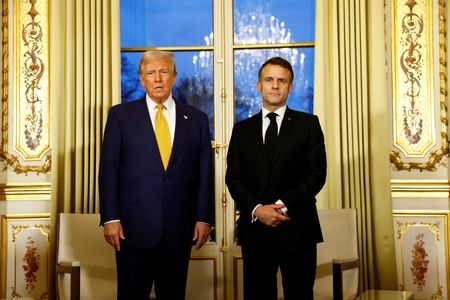By Michel Rose and Dominique Vidalon
PARIS (Reuters) -U.S. President-elect Donald Trump, French President Emmanuel Macron and Ukraine’s leader Volodymyr Zelenskiy held talks in Paris on Saturday, brought together by a grand ceremony to mark the reopening of Notre-Dame Cathedral.
Macron convened the trilateral meeting ahead of an evening event he was hosting to celebrate the cathedral’s restoration five years after it was ravaged by fire.
President Zelenskiy and European leaders have been concerned that Trump, who takes office next month, could withdraw U.S. military aid to Ukraine at a crucial juncture in Kyiv’s battle to repel Russia.
Zelenskiy said the meeting was “good and productive” and that the three men agreed to continue working together.
“President Trump is, as always, resolute. I thank him,” Zelenskiy wrote on social media platform X. “We all want this war to end as soon as possible and in a just way.”
Trump was on his first trip overseas since winning last month’s presidential election and the visit to Paris was seen as offering Macron an early opportunity to play the role of mediator between Europe and the incoming president, a role the French leader has relished in the past.
Macron is a strong supporter of the NATO alliance and Ukraine’s fight, while Trump feels European nations need to pay more for their common defense. He has said a negotiated settlement is needed to end the Ukraine war.
Arriving at the Elysee Palace, Trump told Macron they had enjoyed “really great success” working together during his first term in office.
“And it certainly seems like the world is going a little crazy right now. And we’ll be talking about that,” Trump added.
Trump gave Zelenskiy a firm handshake and patted him on the back before Macron stood between them and Trump smiled for the camera.
The meeting between the three men lasted about 20 minutes.
By inviting Trump to the reopening of Notre-Dame, Macron was repeating a personalized approach that had some limited success during Trump’s first term, said Heather Conley, senior adviser to the board of the German Marshall Fund, which promotes U.S.-European ties.
“Mr. Macron knows Mr. Trump greatly appreciates the pomp, circumstance and grandeur of state and he provides it to him in abundance,” Conley said.
Trump later joined world leaders, royals and business tycoons for a ceremony that got underway with the tolling of Notre-Dame’s great bourdon bell.
Trump, who will be sworn in on Jan. 20, has already held discussions with a number of world leaders and members of his team are trying to get up to speed on a number of world crises, including Ukraine and the Middle East.
GLOBAL SPECTACLE
Trump, a Republican, was in power when Notre-Dame was devastated by fire in 2019 and visited France four times while president from 2017-2021, including D-Day anniversary ceremonies in 2019.
“Symbolically, both Mr. Trump’s presidency and Notre-Dame have been restored in approximately the same time period. His visit to Paris is also the opening salvo of his return to the world stage, further diminishing the final days of the Biden administration,” Conley said.
President Joe Biden’s wife, first lady Jill Biden, was representing the United States at the Notre-Dame event.
Republican strategist Doug Heye said Trump would convey a statesman-like position in Paris.
“It’s not images of him at Mar-a-Lago,” Heye said, referring to Trump’s Florida home where he has spent the bulk of his time since the election. “This is the biggest event of the world and he’ll be peer-to-peer with other leaders.”
Macron, who is grappling with a deep political crisis at home after his government was ousted by parliament this week, pursued a non-confrontational approach toward Trump during the latter’s first term, hoping that by engaging with him he could win concessions.
But as the years passed, policy decisions on climate, taxation and Iran in particular caused friction between the two leaders. By the end it was a more fractious relationship.
There could well be disputes in Trump’s second administration, fueled by Trump’s desire to impose sweeping tariffs on Europe and other U.S. trade partners, and disagreement over how to handle the Ukraine-Russia conflict.
Macron invited Trump to the annual Bastille Day military parade in Paris in July 2017, a spectacle that inspired Trump to order up his own military parade in Washington to mark America’s Independence Day in 2019.
Trump hosted Macron at a White House state dinner in 2018, but a year later the two quarreled over comments Macron made about the state of NATO.
“Trump coming to Paris is a ‘good coup’ by Emmanuel Macron,” said Gerard Araud, a former French ambassador to Washington. “It is indispensable to have a direct relationship with the only man who counts in the Trump administration, Trump himself.”
(Additional reporting by Steve Holland in Washington and John Irish in ParisEditing by Ross Colvin, Howard Goller, Toby Chopra and Frances Kerry)



